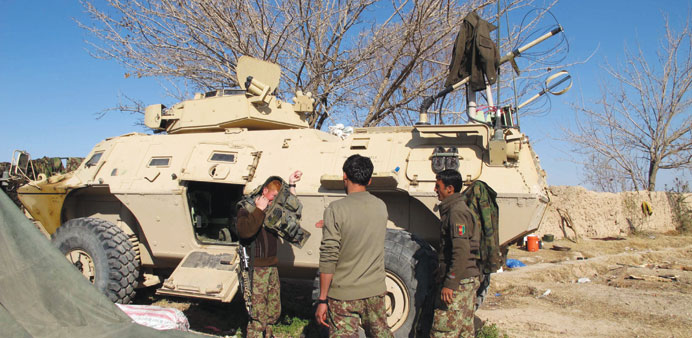AFP/Kabul
Military planes yesterday dropped food and ammunition to besieged Afghan forces in Sangin after Taliban insurgents captured large swathes of the opium-growing southern district, as British military advisers were deployed to the region.
The Islamists broke through the frontlines of the strategic district on Sunday after days of fierce clashes, tightening their grip on the volatile province of Helmand.
Fleeing local residents reported bloody gunfights as the Taliban advanced on the district centre, highlighting a worsening security situation across Afghanistan a year after Nato formally ended its combat operations.
“We are air-dropping food supplies, military equipment and ammunition to support our forces in Sangin,” defence ministry spokesman Mohamed Radmanesh said.
“Sporadic fighting is going on around the district,” he said, rejecting reports of high military casualties and asserting that the district had not fallen to the Taliban.
A resident who fled Sangin said that insurgents had publicly executed at least three security officials after storming government buildings.
“The Taliban dragged two intelligence officials and a local police commander from their homes and shot them dead,” Haji Abdul Qader said.
“Only the governor’s compound and the police headquarters are under government control. The rest have been overrun by the Taliban.”
Qader said he fled to the Helmand provincial capital Lashkar Gah after a mortar bomb landed on his house, wounding his infant son and daughter.
His testimony bore chilling similarities to the situation in Kunduz after the Taliban briefly captured the northern city in September — their most spectacular victory in 14 years of war.
Taliban death squads were accused of summary executions, rape and plundering Kunduz as Nato-backed Afghan forces struggled for two weeks to evict them.
Highlighting the gravity of the situation in Sangin, long seen as a hornet’s nest of insurgent activity, Britain yesterday said its troops had been deployed in Helmand.
A statement from the British defence ministry did not specify the number deployed, but insisted they would not be engaged in combat.
US special forces were also recently dispatched to Helmand to assist Afghan forces, a senior Western official said earlier this week.
The deployments come a year after the US-led Nato formally ended its combat mission in Afghanistan, adopting a training and advisory role to local forces.
Sangin, at the centre of Afghanistan’s lucrative opium trade that funds the insurgency, has been the scene of fierce fighting for years between the Taliban and Nato forces.
British troops fought deadly battles in Sangin for four years to little effect, before US marines replaced them in late 2010 and finally themselves pulled out last year.
The latest unrest in Helmand comes as President Ashraf Ghani has made a diplomatic outreach to Pakistan — the Taliban’s historic backers — aimed at restarting peace talks with the insurgents.
Pakistan hosted a first round of negotiations in July but the talks stalled when the Taliban belatedly confirmed the death of longtime leader Mullah Omar.
A security official in Islamabad said that Pakistan army chief Raheel Sharif would travel to Kabul in the coming days, in what appears to be a renewed push to jumpstart talks.
But, said Kabul-based analyst Haroon Mir, the escalating war in Helmand suggests “the Taliban are not as willing as the Afghan government to sit on the negotiating table”.
“Or they want to make more military gains and win new territory to eventually join talks in a position of strength,” he said.

Afghan National Army soldiers prepare for combat during an ongoing battle with Taliban militants in the Nad Ali district of Helmand yesterday.
